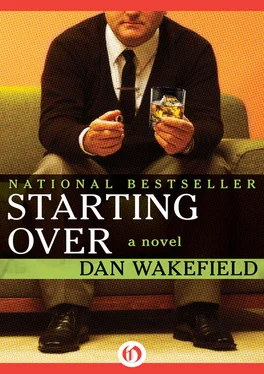Starting Over: A Novel
Dan Wakefield
To my following brothers and sisters ,
nephews and niece: Wayne, Margaret ,
Wayne Jr., and Daniel Kelley
Shaun, Dorothy, Michael ,
Liam, and Kate O’Connell
with love
The author wishes to express special thanks to Robert Manning and the entire staff of the ATLANTIC MONTHLY for providing the felicitous facilities and fellowship which enabled him to finish the novel during the long Boston summer of ’72 .
The past is a dream and the future is a mist. The great moments pass away. What amuses man is to be puzzled, not to know the outcome of a boxing match or a baseball game. A man is never satisfied.
—MUHAMMAD ALI
in Sports Illustrated
There were only three things I was afraid of—God, sex, and being alone.
—MERCEDES MCCAMBRIDGE
on The Steve Allen Show
Potter was lucky; everyone told him so.
“You’re lucky,” they said, “that you didn’t have any children.”
Divorce wasn’t any bowl of cherries, of course, but as long as there weren’t any children involved it wasn’t an irreparable damage, like the sundering of a full-blown family. Just the busted dream of a couple of consenting adults. When Potter met new people and the subject of his recent divorce came up, he was congratulated so often for not having any children, he was tempted to start passing out cigars of celebration, saying heartily, “It wasn’t a boy— or a girl!” But instead he did the appropriate thing, which was to shake his head in a kind of thoughtful wonderment and breathe a relieved whew . Nobody loves an ingrate.
Potter indeed was glad that he hadn’t brought any innocent parties into the mess, but the fact that things could be worse is little comfort when they’re bad enough. The truth was, divorce had disappointed him. Maybe, like marriage, he had expected too much of it.
He naturally assumed that when he got the divorce he would feel a sense of relief and release. He had spent five tumultuous years with Jessica, the last four of them in a state of holy matrimony, the last one of those in a state of desperation that he felt sure could only be alleviated by divorce. It took that year to persuade his wife it was best for both of them, and she finally agreed to go down to Haiti for one of the quickie splits offered there. It was one of the popular spots for such transactions since Mexico had, in effect, gone out of the business.
A lawyer told Potter the Dominican Republic would be better, legally, but Jessica said since the whole thing was his idea anyway, and as she was only doing it as a favor she ought to get to go where she wanted and stay on afterward for a vacation. Potter had offered to give her the household goods and three thousand dollars from his savings account of $4,172.37 so that she would have time to re-settle if she wanted, and take a break from work for a while. They both agreed it was fair for their own circumstances, though sometimes Jessica mumbled the word “alimony,” which made Potter very nervous and anxious to accede to her wishes. As to the divorce site, she explained that the Dominican Republic sounded drab and official, while Haiti had “color.” Potter privately imagined that she wanted to go to Haiti in order to offer herself as White Queen in some voodoo ritual gang-bang, just to spite him, but he couldn’t raise that as an argument and so gave in. He got a postcard from Port au Prince, with a beach scene. It wasn’t signed, it just said, in Jessica’s carefully manicured script: “You’re free now.”
Free .
The word sunk into him like a stone.
Instead of relief, he felt a kind of interior pain that varied from dental-drill intensity to a secondhand ache.
“What you’re feeling,” said Arnie, “is only natural.”
Arnie was a hip psychologist who lived on some sort of commune around Nyack, and came in three days a week to the Hotel Royalton in midtown Manhattan, where he held office hours, counselling the numerous theatre and music people who liked his informal, wide-ranging approach to their hangups. The public relations firm that Potter worked for handled a lot of show business clients, and through them he had heard considerable praise for Arnie Freiheiter, and had met him informally at parties, so that making an appointment with him didn’t seem like such a big deal as going to a regular shrink in an Upper East Side office. It just seemed like dropping around for an hour or so to chat with Arnie. Still, Potter was somehow annoyed by the fact that Arnie sat cross-legged on the couch, without any shoes or socks on. Potter felt that if a guy was going to deal with your problems he might at least put his shoes on.
“What the hell is natural about it?” Potter asked. “What I’m feeling?”
Arnie shrugged. “Like,” he said, “any kind of split. Like you leave home when you’re a kid, you feel homesick.”
“But I wanted to leave,” Potter said. “My wife, I mean.”
“Right. Just like the kid may have wanted to split from the scene at home and go away to camp, but then when he gets there he’s homesick.”
“You mean to say I’m homesick for my wife?”
“Look. When you split from someone, no matter how bad it was, you feel a loss. You were used to your marriage. It was comfortable.”
“Fuck it was comfortable.”
“I don’t mean like that. I mean in the sense that it was familiar.”
Potter felt like thanking Arnie for his time, but he knew the hour wasn’t nearly up and it would have seemed rude to leave. He would have given his left nut for a stiff belt of Scotch, but he knew that Arnie didn’t drink. In fact, Arnie was in the process of rolling a joint.
Potter shared it with him, as he always did when offered grass, because he had learned it was more of a hassle to refuse and have to hear lectures about the glories of the weed and how you just weren’t getting it down in your diaphragm if you weren’t getting high. Potter was a drinking man and grass only made him sleepy, but he smoked it to be sociable and forestall people from preaching at him.
Potter took a deep drag, coughed, and passed the damn thing back to Arnie. He concentrated on holding it in, tried to think it into working, and began to think of all the other times he’d been through this—picturing people, places, rooms—when he realized Arnie was asking him something.
“What?”
“I asked,” Arnie repeated, “if you’d ever read Doris Lessing.”
Potter admitted he had not, and Arnie explained that more and more of his women patients had been laying her books on him, and he’d really begun to get into her stuff. He advised Potter that if he wanted to be able to have a meaningful relationship with a new woman, he would do well to get into Lessing himself. Potter nodded, squelching a yawn.
“Lessing,” he said, as if making a mental note.
Cabs were battling below, on Forty-fourth Street. The Algonquin, with its marvelous cocktail lounge, was only a stone’s throw away. Potter figured he might just stop off there for a quick one on his way back to the office. Arnie had uncrossed his legs, stood up, stretched, and reached into his shirt to scratch at his belly. He said he’d be happy to see Potter again next week, his fee was forty dollars. Potter wondered if that included the joint. For the same amount, he could buy five fifths of good Scotch. Which is what he would do from now on.
Olney and Sheperdson, the PR firm Potter worked for, was holding a cocktail party at Sardi’s to introduce the press to the cast of Serenity! , a new improvisational musical based on the Bhagavad-Gita. Heskel, the man from Billboard , was nudging Potter and pointing at one of the girl Serenity! singers, all of whom were dressed in mini-saris. “I could meditate on that little ass of hers for quite a spell.”
Читать дальше












